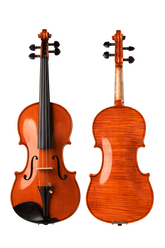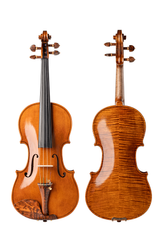How to Prevent Accidental Violin Damage: 11 Essential Care Tips
A violin is one of the most delicate instruments, and even a small accident can cause heartbreaking damage. From collapsing bridges to cracks caused by humidity changes, most incidents happen during daily use or careless handling.
Here are 11 practical tips to protect your violin (and other string instruments like viola or cello) from unexpected damage.
1. Place the Violin with Its Back Down on the Table
When you need to set your violin on a table, always place it with the back facing down.
If you leave it face-down, the bridge and soundboard can collapse under pressure. This is especially important for young students.
2. Carry the Case in the Right Direction
Whether carrying by hand or on your shoulder, make sure the back faces inward and the case cover faces outward.
The back is stronger than the top, so this reduces the chance of the fragile top plate being damaged if bumped.
3. Check and Adjust the Bridge Regularly
Frequent tuning makes the bridge lean forward.
If left unchecked, this can cause:
-
The bridge to collapse, damaging the top plate
-
Permanent bridge warping
Get into the habit of checking the bridge angle and adjusting it back to its upright position.
4. Control Humidity and Dryness
Violins are extremely sensitive to humidity:
-
Too humid → swelling, mold
-
Too dry → cracks, glue failure
Tips:
-
Use a dehumidifier in damp areas
-
Use a violin humidifier tube in dry climates
-
Avoid relying only on a small dry box—sudden humidity changes can harm the instrument.
5. Avoid Extreme Temperatures
Both heat and cold can damage your violin:
-
Cold → wood shrinkage, cracks
-
Heat → glue softening, seams opening
Solutions:
-
In cold areas, use an insulated violin case cover
-
In hot areas, never leave the violin in direct sunlight or overheated rooms
6. Never Leave the Violin in a Car Trunk
Common accidents include:
-
High heat causing seams to open
-
Car crashes damaging both the case and the violin
Always carry the violin with you instead of storing it in the trunk.
7. Do Not Leave the Violin on the Floor
Real case: during a household flood, a violin case left on the floor was completely destroyed by water.
Safer option: keep it on a desk, table, or elevated shelf.
8. Do Not Leave the Violin on a Chair
One musician left their violin on a chair, and someone accidentally sat on it.
Always place it in a safe spot—preferably higher surfaces.
9. Secure the Neck Strap Inside the Case
Most violin cases include a neck strap or Velcro fastener. Always use it.
It significantly reduces damage if the case falls or is hit.
10. Take Precautions When Shipping or Checking In
If you must ship or check your violin on a flight:
-
Loosen the strings
-
Remove the bridge
-
Secure loose accessories
This prevents cracks and severe damage during transport.
11. Inspect Case Straps and Hooks Regularly
Many accidents happen because of a broken strap or hook.
Make it a routine to check before carrying your violin to avoid a dangerous fall.
Conclusion: Small Habits, Big Protection
Violins are fragile instruments, but with consistent daily care and safe handling, you can protect yours from most accidents.
-
Place and carry correctly
-
Watch humidity and temperature
-
Check the bridge, straps, and accessories regularly
These simple habits ensure your violin stays safe and beautiful for years.
Have you ever experienced an unexpected accident with your violin?
Share your story or tips in the comments—we’d love to hear how you protect your instrument!





